their mom’s belly in search of milk. The new mom is usually very excited and concerned about each newborn, and sometimes overly enthusiastic about chewing off the umbilical cord,
which may later result in an umbilical hernia that will take a little longer to close, but is no danger to the puppy.
Once we see that the new puppy is happy, active, dry, and nursing nicely, we will place a colored ribbon on his/her neck, and weigh the little one. We record the ribbon color and weight of each puppy so that, when we weigh the pups
throughout the next days and weeks, we can make sure that each one is gaining weight. Normal weight for a newborn German Shepherd puppy ranges from 370g to 600g (0.8 lbs – 1.3 lbs), with the average being around 1 lb.
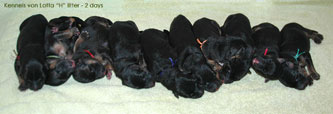
We take great care to ensure that our newborn German Shepherd puppies have the best chance for a healthy start. A German Shepherd female can be in active labor for 6 to 18 hours, sometimes even longer if she takes a break while having a
large litter, and we of course do not leave her side during this time. I stay up making sure that the whelping box (which is always in my office or bedroom) is clean and dry after each puppy is born, and that the temperature stays
constant 86 - 88 F in the room. We keep the temperature at this level for about 2 weeks, gradually reducing it down to normal (65-80F) by the end of the third week.
Someone is always present with the puppies during the first 5 days. I normally stay in the office, doing some German Shepherd research, working on my website, or just watching movies online – all day long with brief 3 minute breaks now
and then. Chad, my husband, usually takes on the “night shift” and sleeps in the room with the pups, so that he can wake up in case someone gets stepped on by the mom, and also to check on the air temperature periodically.
I handle the puppies several times a day, as well as weigh them every other day during this period, to make sure that everyone looks and acts healthy, nurses well, and is gaining weight. I usually buy a dozen fluffy cotton towels, and
use two at a time as bedding for the whelping box. Being 100% cotton, these towels provide natural warm support and a good gripping surface for puppies’ feet when they move about. I change these towels twice daily at this stage to make
sure the puppies are always clean and dry.
Starting from day 3, and until day 16, I follow
The "Super Dog" Program for our puppies - an early neurological stimulation program described by Dr. Carmen Battaglia. It
has numerous benefits later in life for puppies.
By the end of the
1st week of life, German Shepherd puppies usually weigh 730g – 970g (1.6 – 2.1 lbs), approximately doubling their weight. Often, puppies that were born the smallest overtake the bigger ones. Even at this tender
age strong individual differences can be noted among German Shepherd puppies. There is usually the feisty one, who practically “runs” around the whelping box, and the fat one, and the cry-baby, and the cuddly one, etc. Also, there is
difference in their color and markings, and long-hair German Shepherd puppies can often be identified at this age. 1 week old German Shepherd puppies still cannot see or hear, and although very mobile and active, their getting about
cannot be called walking just yet.
The new mom is very attached to her puppies at this age and is very reluctant to leave them even for the shortest time. She usually develops a “wolfy” appetite and eats about 3 times her normal ration, with lots of tasty “extras” added
such as liver, extra chicken backs, and egg yolks, all needed to support the increasing demand for her milk. She spends a lot of time sleeping with the puppies nursing peacefully, and is also very happy to be busy cleaning each puppy
several times a day and flipping them around gently with her nose.
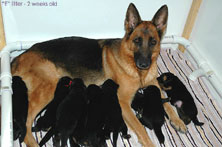
At about
2 weeks of age German Shepherd puppies actually start looking more like puppies, and not just fat black sausages with feet attached. They start to open their eyes, hear sounds around them, and even play with each other,
which is very funny to watch, as they are very clumsy, slow-moving, and often fall off to the side as they struggle to play, but they pretend to be “dangerous killing machines” just the same.
At this age, if the litter is especially large, or the mom simply doesn’t have enough milk, we may start to supplement German Shepherd puppies from a bottle. We use undiluted evaporated goats milk from a can, warmed up to be pleasant to
the touch. Most puppies readily accept the bottle, and we consider this to be very important bonding and social time as well. Often, we will even supplement puppies that don’t really need it – just to make sure we spend such quality
bonding time with each puppy.
Three weeks of age is my favorite age of all. The puppies now can be recognized as German Shepherd puppies. They are alert, playful, and there is a lot of wrestling, tail-wagging, and even barking going on as they explore their
surroundings and interact with each other and their mom, all of which is extremely cute. I will often just sit in the whelping box with them, letting them play with my clothes, climb up on my lap, and generally just enjoying their
carefree company. We also provide them with various toys starting at this age, and make sure that they listen to loud music, banging on the door, vacuum cleaner, etc.
At three weeks, German Shepherd puppies already walk quite nicely, bounce around, and of course think that they are very swift, when in fact they often fall as they try to make some special “ace” maneuver. They weigh around 1.3 – 1.8 kg
(2.8 – 4 lbs) at this age, and this is a good time to start introducing them to some solid food, such as raw ground beef. At first, they may not have a lot of success with it, as some of them try to suckle on the meat, but in a few days
they master this new type of eating very well. We also continue giving them goats milk, but in a shallow saucer pan now, and with some rice baby cereal added, so that they can practice lapping.
At this age, the mom is no longer so keen on constantly staying with her puppies, and only visits them to feed them and for a clean up. We continue changing the bedding twice a day now, knowing very well that in about a week it will
become 3-4 times a day, as the mom will not be able to keep up with her cleaning duties any more. We wash soiled towels with a little bit of bleach and a little bit of perfume-free detergent.
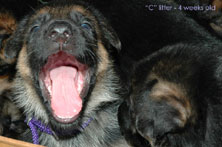 Four weeks
Four weeks of age is even more fun as the puppies keep developing, but the amount of cleaning starts to increase in geometrical progression, and it becomes a full time job to keep the puppies well fed and clean. The mom is only
visiting now and then at this point, and enjoys spending her time in the office, so that she can hear and see the puppies, but not necessarily be with them. I don’t blame her, as their claws are pretty sharp even though I trim them every
week, and at this age the baby needle teeth are already in, and being used.
Mother’s milk supply decreases as the appetites of the puppies increase, so at 4 weeks of age German Shepherd puppies rely on us to feed them perhaps 70% of their food intake. With mom visiting for a few brief feedings each day, we feed
them three times a day with the following diet:
1. Raw ground beef with high fat content (30% fat) – about 1/4 lb per puppy
2. Cottage cheese (2 tbsp per puppy), mixed with plain yogurt (1 tsp per puppy), evaporated goats milk, rice baby cereal (1 tsp. per puppy) and with egg yolks (1 yolk per 5 puppies)
3. Raw tripe, or beef liver cooked with all kinds of vegetables
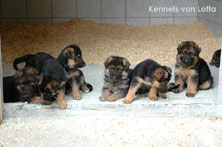
At about
5 weeks of age the duty of keeping the whelping box clean becomes nightmarish, and this is a good time to introduce German Shepherd puppies to the outdoors. At first, they only visit outside for 10-15 minutes at a time,
when it’s warm and the weather is nice, but by 6 weeks of age they move out into our puppy room pretty permanently. This is a room that is a part of the house, but has free access to the outside world. This room is equipped with a wooden
resting platform so that puppies do not lay on concrete, with a heating lamp above it, and the floor is completely covered with a layer of pine woodchips.
The outside area is about 6 x 6 ft and the floor is made of paving stones. There is another wooden laying platform here. Several times a day, all puppies come out into the yard (1/2 acre fenced) to play in the grass, use the bathroom,
visit with their mother, interact with us, etc. This is a very important period when we introduce our German Shepherd puppies to more noises, show them the way in and out of the house, introduce them to the other dogs, play tug-of-war,
etc.
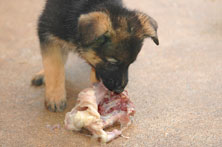
Starting at
6 weeks of age we add raw chicken backs and necks daily to our German Shepherd puppies’ diet, to make sure that they master chewing through the bones, as these are excellent natural source of calcium and phosphorous
for them, which is very important, as they grow so fast. Also, we introduce raw frozen sardines and "The Honest Kitchen" products to their diet, and will occasionally feed kibble, soaked well in warm water and mixed with green tripe from
a can
At 3, 5, and 7 weeks of age our German Shepherd puppies get dewormed with a high quality wormer, to be certain that they are free of intestinal parasites.
At about
6 weeks of age the puppies get their first combination 5-way vaccine (including Parvo and Distemper), and at 7 weeks of age we start welcoming visitors who are interested to come and look at the puppies. Often during
weekends we have several groups of visitors of all ages coming to interact with the puppies, which is such a great socialization opportunity for them.
At
7.5 weeks our German Shepherd puppies get microchiped and are ready to go to their new homes shortly thereafter! It is sad to see the little ones go, but because we make sure they go to great homes, and because our home is
never “dogless,” it is not as hard to part with the puppies as one might think. Of course there is always one special one that I really grow attached to, and often I will end up keeping him/her, but at a certain point we have to make
sure that we don’t have more dogs that we can give enough daily individual attention to.
Copyright 2009-2013. For information on making use of the "German Shepherd Puppies" article see
Terms and Conditions